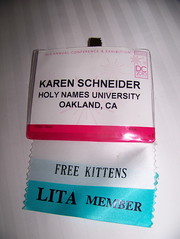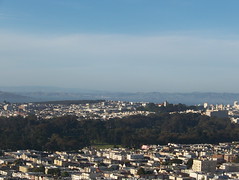Hotter than blazes, but still a great venue, even after a major blister on one foot made me limp. Great discovery: the Circulator, which for $1 brought me from Georgetown (church with my stepmom) back to the CC in air-conditioned bliss.
Presentations: “Ultimate Debate 2010: Open Source Software: Free Beer or Free Puppies?†Sunday, June 27, 1:30-3:30 p.m. Approximately 400 in attendance. Co-presenters: Stephen Abrams, Gale/Cengage; Marshall Breeding, Vanderbilt University; Roy Tennant, OCLC (debate moderator). It was what it was. The best responses came from audience members who testified to the value of “open” in their libraries. Thanks to Ranti Junus for the “Free Kittens” badges.
Best showcase: ALA Learning Roundtable (LearnRT), of course, because Nicole Greenland of MPOW, was presenting, and her poster session about faculty development was excellent. This was a well-attended event where librarians showed off their innovative techniques for information literacy.
Best program: LITA President’s Program; Mary Madden from Pew Internet Research on “four or moresâ€â€”people who own four or more portable electronic devices. Early adopters are as racially diverse as the general population, but tend to be male, and the biggest early adopter group is not teens or young adults, but the 30-49 age range. She spent quite a while covering actual (as opposed to assumed) behavior of teens and young adults. While a typical teen texts on average 50 times per day (probably due to all-you-can-eat texting plans and the fact that parents are paying for these plans), not all other popular assumptions are correct. For example, teens and young adults are far more attentive to managing their privacy settings than other age groups. For similar higher ed issues, Madden also recommends Steven Jones’ work on the impact of tech on faculty.
Best unofficial program: Battledecks. This program first appeared in 2008 at South by Southwest, the popular tech/music conference. Librarians have adapted Battledecks to make it even harder! In front of a packed, boisterous audience, 7 contestants (kept in advance in a “green roomâ€) presented consecutively on 20-slide sets of PowerPoint slides they had never seen before on the theme of “change in libraries,†with additional rules that they had to stay within 5 minutes. All were good, and some were excellent. Judges then picked the winners, and the audience picked their own favorites. I have been asked to help bring technology to the last day of the California Library Association next fall, and if I accept this activity, Battledecks will be on the menu.
Best vendor visits: RefWorks (nice to get hugged by a vendor 🙂 ), Ebsco (will visit soon), Serial Solutions (gave us a credible display of its spendy new COUNTER-compliant usage product), ITG (our incredibly patient RFID vendor), Marcive (a recon vendor), ebrary, Computype (despite its name, it deals primarily in spine label printers), and Equinox.
Best user group meeting: Navigator, where Rick Burke, ED for SCELC, diplomatically but clearly explained to OCLC areas of growth for their project management for Camino, the SCELC Navigator pilot. I am a big, big believer in Camino. This has the potential to tie together over 100 small libraries into a resource-sharing powerhouse. It is bumpy, but we will get there.
Best product demo: ContentDM, a discovery tool for electronic scholarly communications (ETDs, etc.). We have a free license for the starter version (up to 3000 “objects†can be displayed and ingested in this hosted version). Two libraries demonstrated how ContentDM provided an easily-configurable gateway for a wide variety of heterogeneous content.
Best social hours: LITA Happy Hour, where I met with nerdy colleagues, and then an event at the Hotel Monaco celebrating the 40th Anniversary of GLBTRT (Gay, Lesbian, Bisexual, and Transgender Roundtable). Networked with people I have known for decades, including Amy Kautzman of UC Davis, who is quite sharp on metadata and encouraged me to tap her brain on issues related to cataloging. Brought my friend Zoe, who is a candidate for LITA President.
Best free-range idea to surface in my mind while taking Super Shuttle to my hotel: With respect to our backlog… why not replace those books with e-books? I ran this idea past a dozen colleagues. I never heard one strong reason not to include this in the choices for addressing our cataloging backlog. I know some terrific recon vendors. No quarrels there. But… hmmm.
Best geek moment: Using my iPhone to read a QR code in the Alexander Press booth, which won me a special playlist good through July. I was their first booth visitor to recognize the QR code and have a reader that could interpret it.
Best nomenclature suggestion: Substitute “research success†for “information literacy†(by way of Pat Wagner, library services consultant).
Best hallway advice: Look at Lippincott’s e-journal collection to replace some of our print journals for nursing (Roy Ziegler, Florida State).
Best personal demo of technology: Several friends allowed me to play with their iPads. A definitely interesting device with strong potential for activities that are reading/viewing intensive. Not a (keyboard) input device, but still useful in ways people are just beginning to understand. Everyone I spoke with who owned one said they found it extremely useful.
Other things I did: Attended the OCLC Record Use Policy session; have a quiet dinner with a friend who is a librarian for the State Department and is on the move from Delhi to Pretoria; attended the LITA Awards ceremony.
A great ALA.















